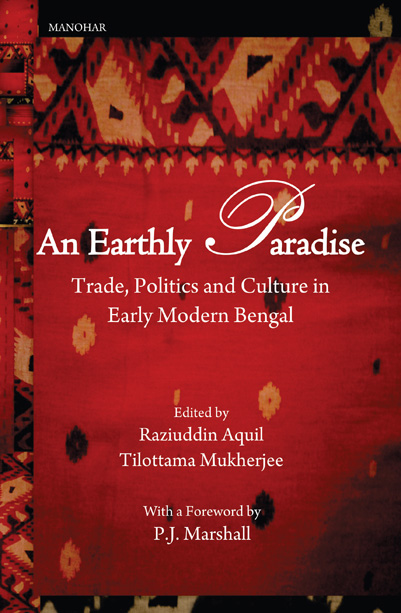An Earthly Paradise: Trade, Politics and Culture in Early Modern Bengal
Raziuddin Aquil is Associate Professor, Department of History, University of Delhi. He was previously Fellow in History, Centre for Studies in Social Sciences, Calcutta. His most recent book is Lovers of God: Sufism and the Politics of Islam in Medieval India (Manohar ). Tilottama Mukherjee teaches in the Department of History, Jadavpur University, Kolkata. She is the author of Political Culture and Economy in Eighteenth-Century Bengal: Networks of Exchange, Consumption and Communication (Orient Blackswan). ... Read more Read less
This collection of articles on varied facets of early modern Bengal showcases state of the art in the field and hopes to encourage new research. The essays explore the trading networks, religious traditions, artistic and literary patronage, and politico-cultural practices that emerged in roughly sixteenth-eighteenth centuries. Using a wide array of sources, the contributors to this volume, coming from diverse academic affiliations, and including several young researchers, have attempted to address various historiographical ‘black holes’ bringing in new material and interpretations. Early modern Bengal’s history tends to get overshadowed by the later developments of the nineteenth century. What this assortment of articles highlights is that this period needs to be studied afresh, and in depth. The region underwent rapid transformations as it got politically integrated with Northern India and its empires and economically with extensive global economic networks. Combined with its unique geography, the trajectory of this region in all spheres manifest an almost constant interplay of local and extra-local forces – be it in literature, art, economic domain, political and religious cultures – and considerable enterprise and ingenuity. Thus, a variety of themes – including travel accounts, Portuguese and Arakanese presence, early Dutch, French, Ostend companies’ forays into the region, artistic production in the Nizamat and later collections of art and missionaries, the English company state’s intrusions in local economy in salt and raw silk production and indigenous reactions and rebellions, consumption practices related to religious activities, circulation and translation of texts, representation of women in vernacular writings, and organization of religious traditions – have been analysed in this volume, with a wide ranging introduction tying up the themes to the broader historiographical issues and contexts. The collection will be an invaluable reference tool for students and scholars of history, especially of early modern India and Bengal.
... Read more Read less










